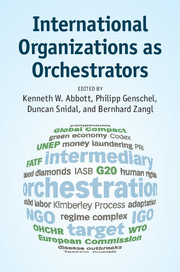Book contents
14 - Orchestrating global governance
from empirical findings to theoretical implications
Published online by Cambridge University Press: 05 April 2015
Summary
We started this project with a puzzle and a hunch. The puzzle was whether and how IGOs can have an impact on international governance even though they lack the authority and resources normally seen as necessary for successful governance. The hunch was that this could be understood by investigating IGOs’ use of “soft” governance techniques to mobilize third parties to assist in achieving IGO goals.
In the introductory chapter of this volume, “Orchestration: global governance through intermediaries,” we theorize our initial hunch, both in general terms and for the special circumstances of IOs. We introduce the concept of orchestration, a mode of governance that is soft and indirect; orchestration thus stands in contrast to modes of governance that are direct and/or hard, including hierarchy, collaboration and delegation. In orchestration, one actor, the orchestrator, enlists the voluntary assistance of a second actor, the intermediary, to govern a third actor, the target, in line with the orchestrator’s goals. We refer to this as the O-I-T model of orchestration. We focus in this volume on the special case in which the orchestrator is an IGO. The introductory chapter introduces six hypotheses regarding the conditions under which governance actors, and IGOs specifically, are likely to engage in orchestration.
- Type
- Chapter
- Information
- International Organizations as Orchestrators , pp. 349 - 379Publisher: Cambridge University PressPrint publication year: 2015
- 15
- Cited by

